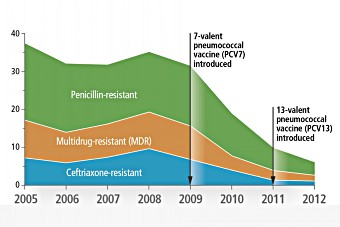
New York, 19 September 2016 - With the United Nations General Assembly set to discuss anti-microbial resistance (AMR) at a high-level meeting this week, Gavi CEO Dr Seth Berkley has highlighted the role of vaccines in reducing drug resistant infections.
“Increasing global-vaccination coverage is a highly cost effective solution,” Gavi CEO Seth Berkley writes in an op-ed published in the Wall Street Journal on Friday. “Preventing infections not only saves lives, it also reduces the ability of bugs to develop resistance.”
With the over-prescription of antibiotics and other drugs driving the spread of drug resistant bacteria, the increased use of vaccines will help by preventing infections in the first place. This saves lives by preventing illness, but will also immediately reduce the selective pressure that causes bugs to develop resistance.
Earlier this year, an independent report commissioned by the UK government and the Wellcome Trust, and chaired by economist Jim O'Neill recommended “an increased uptake of available vaccines” as one of 10 global actions to address AMR.
Pneumococcal vaccine
AMR study: Vaccines reduce antibiotic resistance
Incidence of antibiotic-resistant invasive pneumococcal disease in children < 2 years, South Africa (cases per 100,000 person-years)

Source: A von Gottberg et al, for GERMS-SA. Publication submitted April 2014
A study published in the Lancet has estimated that universal coverage of the pneumococcal vaccine could prevent 11.4 million days of antibiotic use per year in children aged under five. WHO estimates that by the end of 2015, 76 million children in developing countries had received pneumococcal vaccine with Gavi support.
Similarly, increased immunisation coverage with the rotavirus vaccine – another Gavi-supported vaccine - would help reduce the over use of antibiotics in developing countries to treat diarrhoeal disease. Although antibiotics are not effective against viruses, a major problem driving antibiotic resistance is that these drugs are often used incorrectly when people are suffering from viral infections. Preventing the viral infections in the first place therefore also reduce the use of antibiotics.
Financial incentives
In his article, jointly written with Dr Jeremy Farrar, director of the Wellcome Trust, Dr Berkley also underlines the importance of providing financial incentives for pharmaceutical companies to conduct urgent R&D that identifies new antimicrobial drugs to replace ones lost to resistance – and guaranteeing a market.
“Such efforts have already been applied in developing countries by Gavi with great success in the development and uptake of pneumococcal vaccines that are now in the national vaccine programmes of 54 low-income countries,” he writes.
According to the UK Report, there are currently “no licensed vaccines for any of the bacterial species that are considered by the US Centers for Disease Control and Prevention to represent our most urgent AMR threats.”
Click here to access the joint Seth Berkley-Jeremy Farrar article in full on the Wall Street Journal’s website.
Dr Seth Berkley was CEO of Gavi, the Vaccine Alliance from 2011–2023.
